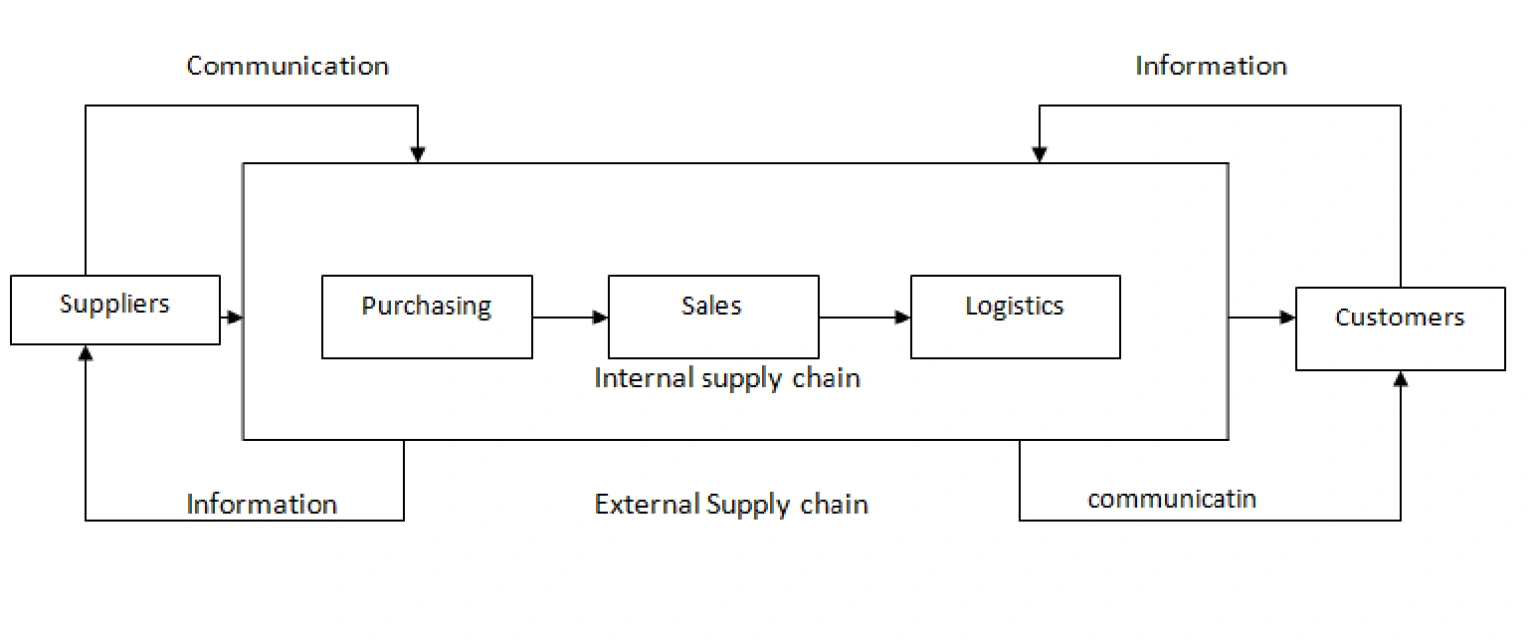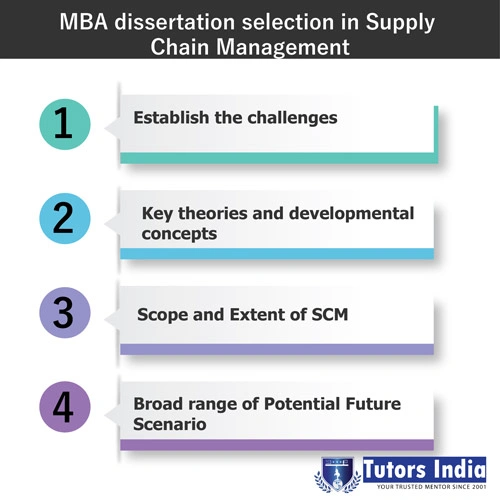MBA dissertation selection in SCM
Abstract
Supply chain management (SCM) is one of the significant fields where a lot of research has been conducted in the last two decades. The main goal is to assess and establish the challenges that supply chain management faces to attain an integrated system with better organization. Based on the key theories and developmental concepts in supply chain management, the challenges of developing and enhancing communications and internal collaboration within supply chain organizations have been explored. The strategies and challenges for developing and enhancing the supply chain collaboration and communication are assessed. The role and effectiveness of information technology in supply chain integration is also being evaluated.

Introduction
SCM is a research area where new studies and projects always emerge due to the rapid changes in business and also face new challenges that directly affect the supply chain management of the organizations. The modern supply chain has features like flexibility, integration, proactive, and information technology-based. Information technology-based SCM removes the old way of work and old practices completely and always uses an innovative way to manage the core fundamentals of the supply chain. 1

Image: Supply chain activities 4
Interesting Topic for Dissertation: Employment Economic Research Proposal
Topics for exploration
Based on the scope and extent of SCM, there is a wide range of topics that could be researched. The topics are abundant and diverse where the scholars can address the problems from almost any domain or perspective that has been chosen. The relationships of supply chain associates or the consumer’s role in SCM strategies can be examined by the researchers. Individual components, the entire supply chain, or the portions of the chain can be designed by the modelers. There is still a vast need to study many traditional topics such as transportation, inventory management, warehousing, and others, from the perspective of the supply chain rather than an individual’s point of reference. 2

Topics in SCM
1. Dancing the Supply Chain: Transforming SCM.
There are several theories that dominate the supply chain management which receives a constant view on the supply chain and its management thus supporting a global chase for efficient labor and resources. Accordingly, supply chain systems have functioned without much concern for their wider contextual background. This perspective ignores the view that supply chains have become both harmful and vulnerable systems. The current and enduring crisis has stressed that the processes and structures of the supply chains are interwoven and fluid with political‐economic and environmental phenomena. Based on the panarchy theory, the supply chain has been reinterpreted as a social–ecological system in this project and leaves a modernist outlook of SCM, restoring it with a more up-to-date visualization of “dancing the supply chain.” Panarchy is a formation of adaptive cycles that are related across various levels on scales of space, time, and meaning. It represents the complexities of the world more efficiently than reductionist and static hypotheses ever could, and also provides the fundamentals for transformative SCM.
2. Supply chain redesign challenges for the circular economy: a review and a methodology
Even though organizations face various challenges in redesigning their supply chain for the Circular Economy, there is a lack of systematization in the literature for such challenges and for ways to overcome them. Based on a systematic literature review, this project determines and organizes 24 main challenges that may slow down the redesigning of a supply chain for the Circular Economy. Among these challenges, 16 are well known from research in associated topics. The remaining eight are comparatively new in the context of the Circular Economy. A multiple case study has been conducted in the household appliance supply chain, to investigate how these challenges occur in practice and how organizations are tackling them. The cases are analyzed that involve performers at various levels of the supply chain and conclusions suggest that vertical integration by one performer in the supply chain is not a required condition for the implementation of Circular Economy. The practical study, in combination with the literature review, leads to the enhancement of a framework relating the challenges to particular levers that organizations may follow to overcome them. This framework has been seen as a suggestion for managers who are undertaking the path through a Circular Economy. The goal of this dissertation is: (i) To provide a group of challenges in Circular Economy in order to redesign the supply chain using an efficient literature review, (ii) Determine solutions to overcome these challenges. The scientific literature must be examined in a systematic way to accomplish these objectives.
3. The impact of efficient planning and influence on the purchasing activities of a manufacturing company
The goal of this paper is to decide the fundamentals in efficiently planning the purchase of the materials for the organization, suggesting another channel for planning, and also determining the common arguments that are frequent in the planning section of any company.
4. The control of outsourced logistics on SCM
The goal of this paperwork is to assess the probable control of the logistics outsourcing function on supply chain management from the strategic approach. To implement this thesis a survey was conducted to gather all the necessary information, in order to evaluate the influence of logistics outsourcing activities. A survey was conducted to target the professionals in the logistics field from France and Sweden with a responsive rate of 36% and 10% has been obtained respectively. A statistical investigation has been performed by using the ANOVA method that helps in evaluating statistically noteworthy results. Hence the investigation performed answers the prepared research questions.
Conclusion
Since the scope and extent of research in SCM is flourishing, wide ranges of opportunities are available to expand and enhance the ideas in supply chains. In order to design a supply chain system to flourish in 2025, supply chain managers must expect the key forces of change that will impact their supply chains and must look to develop their SCM methods accordingly. Considerable uncertainty prevails over how these forces of change get disclosed. So, the supply chain managers must take the necessary steps today to prepare for a broad range of potential future scenarios. They include:
1. Prepare for the supply chain impacts of migration and automation.
2. Develop liable provincial sourcing hubs.
3. Digitalize supplier estimation and commitment.
4. Fortify transparency in the supply chain and its disclosure.
5. Implant climate-smart planning in the supply chain. 6
Tutors India offers the Premier Finance and Economics research paper writing services and coursework help around the world especially popular in the UK, UAE, Australia and Asian countries.
References:
- BSR, 2021, Future of Supply Chains 2025
- Richard G. Mathieu & Raktim Pal, 2019, The selection of supply chain management projects: A case study approach.
- Nand Kishore Prasad, 2020, Thesis and Dissertation topics related to Supply Chain
Management, Procurement Management, Inventory - Management, and Distribution Management.
- Yazid Jaradat, 2020, Evaluate the challenges associated with internal supply chain integration in family-owned business.
- James R Stock, 2019,A research view of supply chain management: Developments and topics for exploration.
- Gholamreza Gholampour , 2020, Strategic And Operational Performance Framework For Automotive Supply Chain.

 Previous Post
Previous Post Next Post
Next Post